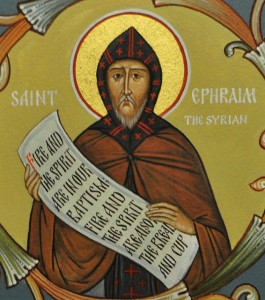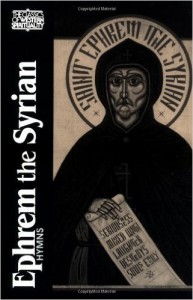
It seems like every church has a praise band leading worship these days, or wants to have one. But let’s face it: a lot of modern worship music, whether praise songs or hymns, is theologically and spiritually shallow. A lot of it focuses on us and our feelings rather than on the glory of God. When it points beyond us, it often selects only a very narrow slice of the theological pie.
If you have any ability to write worship music I offer you a neglected role model: St. Ephrem the Syrian (c. 306-373). He is the great hymn writer of the Syriac Orthodox tradition. Pick up a copy of the volume of his hymns translated by Kathleen McVey in the Paulist Press “Classics of Western Spirituality” series. Read one each day, slowly, as part of your prayer life. It will do you good.
Why do I recommend writers of praise songs read hymns from a guy who died over a millennium and a half ago, a guy who wrote in a foreign language, a foreign poetic style, with a foreign set of theological concepts?
Because, to be frank, Ephrem the Syrian knew how to praise God better than we do.
What I love is his ability to take biblical theology seriously and revel in the mysteries. I’ll give you just one brief example from one of his hymns on Christmas which McVey quotes in her introduction:
The power that governed all dwelt in a small womb.
While dwelling there, He was holding the reigns of the universe.
His Parent was ready for His will to be fulfilled.
The heavens and all creation were filled by Him.
The Sun entered the womb, and in the height and depth
His rays were dwelling.
…
How indeed did that small womb of Mary suffice for him?
It is a wonder if [anything] sufficed for him.
Ephrem is bringing together the stories from Luke and Matthew where Jesus is in Mary’s womb, and reading them alongside John 1 and Colossians 1 where we are told that Jesus is the eternal Word of God, the One who created the whole universe and sustains it in every single moment that it exists.
So the tiny baby conceived within Mary’s body is Mary’s own creator. She holds within her the One who is holding her, and the world she stands on, and everything in all creation.
That’s a mystery.
That can rock your world.
What Ephrem needs is a singable tune.
He has certainly stood the test of time. Our worship songs get called “classics” if they are still in hymnals two decades after they are written. Ephrem’s music has been sung in worship for 1600 years.
Rather than writing it off as old, ponder what might be in those songs that makes them matter to Christ’s followers generation, after generation after generation.
Ephrem is respected well beyond Orthodoxy. The theology in his hymns and other writings earned him the title “Doctor of the Church” in Catholicism. Protestants like him too, once they read him: today he is commemorated in the American Episcopal Church’s calendar of saints.
Back when I was a university student, one of the worship leaders of our college group, Mike Graef, took old hymns by Charles Wesley and put them to modern singable tunes. It was fantastic — he invited us into a theologically rich, spiritually vital world we might have ignored.
Somebody needs to do that today, with the hymns of St. Ephrem the Syrian. Give it a try. I dare you. And when you do, send me the recording, okay?

————
I’d love to hear from you in the comments: What worship music has shaped your faith? What would you like to see more or less of in contemporary praise songs and hymns?
————
So great to have you visiting my site! If you read this far you must be enjoying what you found — why not subscribe for email updates?
See more posts on church music by clicking here, or more posts on saints by clicking here.
————
This post contains an affiliate link.

Leave a Reply